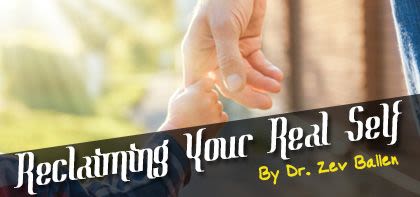
Reclaiming Your Real Self
The false self forms in childhood as a result of children not feeling fully loved and accepted by their parents for who they are; they feel compelled to alter their true nature...

The false self forms in childhood as a result of children not feeling fully loved and accepted by their parents for who they are. When family members, especially the parents, are not emotionally healthy, or if there is strife in the marriage, the children feel unconsciously compelled to alter their true nature in order to “fit in” with their parents and the dysfunctional family norms and rules that have been created.
Children learn to unconsciously deny who they are and what they need or deny their needs altogether. In any case, the child will not risk communicating his real needs to parents he feels don’t understand him or don’t want to understand him. Consequently, he learns how to communicate in a perfunctory, superficial way with his parents, without full conscious awareness that he is hiding from them and withholding his true self.
Children don’t have a choice about this process because they sense they can’t survive without their parents, so they bury their beliefs about themselves, their parents and the world, in order to feel “cared” about and salvage whatever scraps of love and connection they can get.
In this process of self-negation, children lose trust in both themselves and their parents. They lose their center and become progressively alienated from who they are. The child unknowingly develops a false persona, an idealized self that he “believes” is the best way to be; the person others want and need him to be but who he uneasily senses he isn’t.
As the self-alienation worsens the child loses his spontaneity and authenticity, becoming an “actor”  playing a part – an observer of life rather than a participant. He consciously or unconsciously perceives that it is dangerous for him to be real –doing so may cause him to lose his parent’s love. It would be risky to assert himself by directly asking for what he needs or expressing any opinion or preference that is different than those of his parents.
playing a part – an observer of life rather than a participant. He consciously or unconsciously perceives that it is dangerous for him to be real –doing so may cause him to lose his parent’s love. It would be risky to assert himself by directly asking for what he needs or expressing any opinion or preference that is different than those of his parents.
Children must deplete themselves of large amounts of psychic energy just to survive and get the attention and love they need from their parents. All the while the child is only dimly aware of how his unconscious mind has twisted his thinking about himself, and how alienated from his spontaneous vitality, G-d given inclinations, talents and preferences he actually is.
When the child grows into an adult, he still has the potential to develop into the person he was created to be but his true nature needs to be revealed. He must be led on a journey to himself. A healthy child is like an acorn that is planted in fertile ground.
The acorn has been “programmed” by Hashem to grow into an oak tree. Hashem put everything into the acorn that it needs to grow successfully in alignment with Hashem’s plan. The growth process will occur, provided the acorn receives enough water, sunlight and minerals from the earth. It must also be protected from adverse conditions, especially while it is young. So too, a child is “programmed” for a particular purpose in life, and like the acorn, needs to grow in alignment with its nature. When the child can’t be his spontaneous self, conflicts and psychological symptoms form in the child which impedes the process.
Hashem said to Abraham: “Go to yourself, from your land, from your birthplace and from your father’s house, and go to the land that I will show you“ (Genesis 12:1).
“To yourself” means to the essence of who you are. Since the soul is synonymous with emuna, the essence of who you are is emuna. Your soul is perfectly good, has complete emuna and doesn’t need to be fixed in any way. The inner you, the ultimate you, is a piece of Hashem and totally good. The real you wants to think, feel, speak and act in perfect accordance with what Hashem wants.
In order to reclaim your real self, it is necessary to identify and internalize your good points. The process is like a connect-the-dots picture. Your good points and your good desires connect to form a picture of who you really are. Hashem judges you only on what you truly desire because that is within your control. Hashem doesn’t judge you on what you actually achieve because that is in His control.










Tell us what you think!
Thank you for your comment!
It will be published after approval by the Editor.